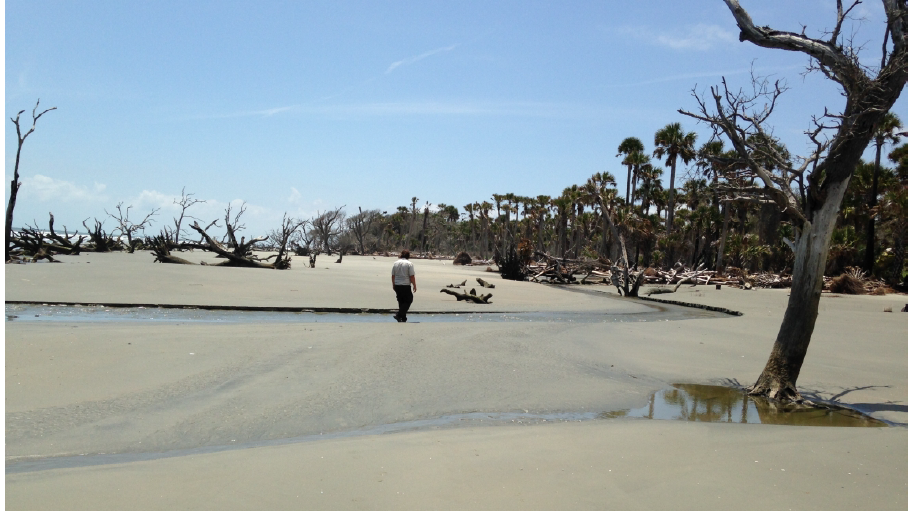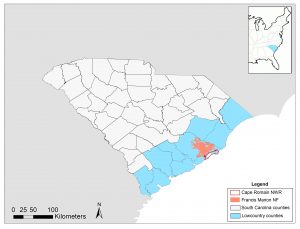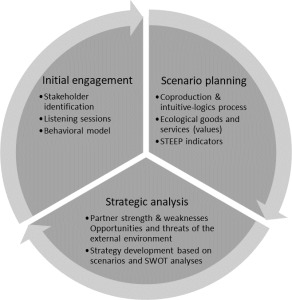Engaging Diverse Stakeholders to Adapt to Climate Change

A new article, “Building adaptive capacity in a coastal region experiencing global change” published on August 10, 2020 in Ecology and Society, details the social process of adaptation planning in the Lowcountry region of South Carolina. This article was co-authored by SE CASC Research Ecologist, Mitch Eaton.
Shaping effective climate adaptation strategies should consider not just anticipated environmental hazards but also the social and cultural characteristics of the people and area at risk, according to a new study. Researchers tested several engagement strategies to help local conservation groups in the Lowcountry of SC develop a process for adaptation planning that includes diverse stakeholder perspectives, collective learning, and collaborative decision making.

Communities facing global changes are confronted with making decisions about how best to cope with an uncertain future. Climate change challenges the resilience of coastal ecosystems in the face of environmental disturbances like sea-level rise, tropical storms, economic downturns, and other sources of social disruption. Adaptive capacity is the ability of a community to act collectively to prepare for these environmental disturbances in advance, or to respond to the effects of these stressors. The greater adaptive capacity that a landscape has, the greater the resilience to these disturbances.

This case study in the Lowcountry region of coastal South Carolina provided a team of SE CASC researchers with several lessons on how to better engage individuals and organizations interested in adapting to an uncertain future. The team is hopeful that this investigation can offer a more structured approach to social-ecological adaptation in other coastal areas. SE CASC Research Ecologist, Mitch Eaton, shares that the team’s “experiences working with federal and state agencies, and local community and conservation organizations to address not only anticipated environmental changes in the region, but also to consider the impacts of social and economic drivers happening at local to global scales has provided insights on the importance of culture, social networks and power in a community’s collective ability to respond to change.”
The Lowcountry region is in the coastal plain of South Carolina and rich in historical and cultural heritage. This area of the eastern United States has already been severely altered by processes associated with human development and the effects of climate change, such as sea-level rise, and the changing frequency of extreme events are now further degrading the capacity of those ecological and social systems to remain resilient in the face of disturbance. The Lowcountry community is adaptive and the community has embraced the concept of social learning–a process in which scientific information is viewed within the context of community values and political processes. This has resulted in the prioritization of ecological concerns and the emergence of a vibrant conservation community.
In this project, researchers worked with the staff of the Cape Romain National Wildlife Refuge to identify management agencies and conservation organizations throughout the region concerned with social, natural resource, and global change issues. This led to the formation of the Cape Romain Partnership for Coastal Protection (referred to as the ‘Partnership’) which includes representation from state and federal resource agencies.
Informal meetings, workshops, and collaborative interactions helped researchers understand how the conservation community pursues and perceives their various missions and how they might address threats they may face in the future. Researchers were able to test engagement activities to better understand how different methods of engagement and understanding stakeholders’ readiness to act can influence the planning processes for adaptation to global change.

Members of the Partnership participated in a stakeholder analysis, identifying as many socio-economic interest groups and individuals as they could within the Lowcountry region that were likely to be affected by change and those with the capacity to effect change. Researchers then conducted a scenario planning workshop in which members of the Partnership identified valuable ecological goods and services–ecological and cultural benefits provided to humans by the ecosystems in which they live–throughout the region and envisioned primary drivers of change in a set of potential futures. Investigators conducted a final workshop, guiding participants through an analysis of strengths, weaknesses, opportunities, and threats for their respective organizations.
The adaptive capacity of a region ultimately depends on a region’s ability to act collectively, and the presence of strong social networks, coordination among a diverse group of stakeholders, and social learning are key elements needed to build that adaptive capacity. Embracing a collective framework for the co-production of knowledge was successful in this case study and is recommended for similar approaches for adaptation planning. Diverse knowledge and cultural and attitudinal perspectives enhanced the group’s ability to co-produce shared understanding and actionable solutions to conservation and resource management problems.
For more information about findings from this project, see the associated Fact Sheet: Building Adaptive Capacity in a Coastal Region Experiencing Global Change.
This work by SE CASC Research Ecologist, Mitch Eaton, Fred A. Johnson (Wetland and Aquatic Research Center, USGS), Jessica Mikels-Carrasco (D. J. Case & Associates), and David Case (D. J. Case & Associates) was supported by the SE CASC project, Climate Change Adaptation for Coastal National Wildlife Refuges.
